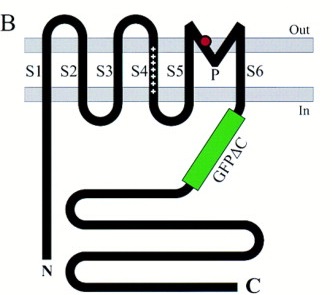
A genetically encoded optical probe of membrane voltage
Abstract
Measuring electrical activity in large numbers of cells with high spatial and temporal resolution is a fundamental problem for the study of neural development and information processing. To address this problem, we have constructed a novel, genetically encoded probe that can be used to measure transmembrane voltage in single cells. We fused a modified green fluorescent protein (GFP) into a voltage-sensitive K+ channel so that voltage-dependent rearrangements in the K+ channel would induce changes in the fluorescence of GFP. The probe has a maximal fractional fluorescence change of 5.1%, making it comparable to some of the best organic voltage-sensitive dyes. Moreover, the fluorescent signal is expanded in time in a way that makes the signal 30-fold easier to detect. A voltage sensor encoded into DNA has the advantage that it may be introduced into an organism noninvasively and targeted to specific developmental stages, brain regions, cell types, and subcellular compartments.